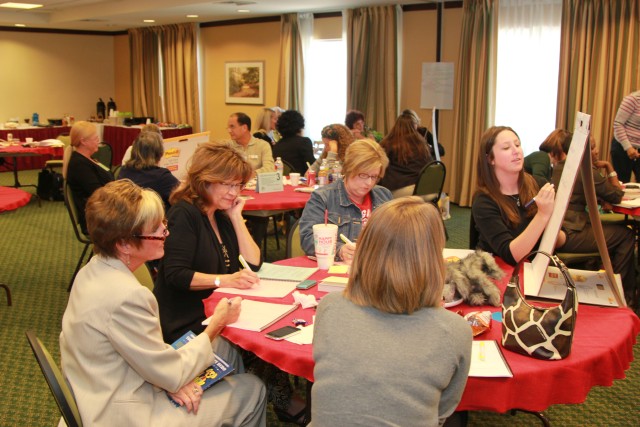
FORT SILL, Okla.-- Fort Sill recently hosted a two-day Special Education Leaders Institute of extensive training on the unique issues facing military children facing military children with special needs due to frequent moves for the sake of the children.
The training was funded through an educational grant given to Fort Sill from the Military Child Education Coalition, a private non-profit organization that is focused on raising awareness of issues faced by military children.
The SELI promotes awareness and increases the number of professional educators, social service providers, parents and caring community leaders who understand the challenges associated with transitioning the mobile military-connected students with special needs from school to school.
"The goal of this institute is to build a worldwide network of educators, social service providers, parents and leaders who work in concert to lessen the challenges military children with special needs experience as they serve too," said Susan Heiligman, a former Lawton resident and teacher, who travels with MCEC to educate others on MCEC and programs available. "The training helps participants become leaders so they can go out and provide parents, staff and community members the awareness of what it's like to be military children with special needs and understand their transitions and concerns. We talk about how those challenges really become amplified for students with special needs."
Heiligman said the participants learn what resources are available in the local community and from MCEC. "We discuss strategies, options, processes and MCEC tools that support transitioning military-connected children with special needs such as SchoolQuest, the Education Resource Center, connections with MCEC partners such as Special Training of Military Parents and the Exceptional Family Member Program for all uniformed services."
Heiligman said MCEC trainers help people realize transition can be a good change. "One of the ways we like to help students cope with change is to provide them with resilience coping strategies, making sure that they have friends, teachers and other adults in their life who are supporting all of this."
SELI brings teachers and counselors from all the surrounding schools together in collaboration with the military community to discuss issues and needs vital to the success of military children, families, schools and therefore the community.
"The more we can support families of the military particularly if they are in deployment situations the better we can serve them in respect to their academic success. We want to give them that layer of support that they need to feel more a part of the community, to fit in," Heiligman said.
Participants in this institute include Lawton, Elgin and Cache special education teachers and counselors as well as Fort Sill Soldiers, civilians and parents.
According to Heiligman, participants receive many books and other literature they can use as resources so they can go out and work with parents, staff and teachers to help get to this place where these kid's special needs are met and they have a good sense of well-being. "This includes adults who support them and give them the confidence to deal with change," she said.
"We felt it was a worthwhile institute to help these educators understand the resources available for military children. Some of those services available include respite care, Camp Cowabunga and the many services available through Army Community Service. If the schools have a special needs child of a deployed parent, we have special programs available," she said.
Christine Carruthers, Exceptional Family Member Program manager, said EFMP is instrumental in ensuring that students get the resources available to them. "The MCEC training and mission is to help military-connected children meet the challenges that frequent transitions pose during their educational years. Specifically, SELI curriculum provides education and resources to educators, social service providers, parents and community leaders who work with our military children with special needs."
Training like SELI make a difference in the lives of military children with special needs because it promotes awareness of the issues that these families experience as they transition from school to school. It further allows an opportunity for professionals to create and maintain a network to make transitions as smooth as possible for our military families, said Carruthers.
"SELI was a wonderful opportunity to network especially because we had a diverse group of educators, social service providers, Family Readiness support assistants, Soldiers and parents attend the training. We also received some great materials including 'Changed by a Child,' by Barbara Gill and 'The Special Needs Acceptance Book,' by Ellen Sabin," she said.
SELI is designed so students leave with tools, processes and a network in place to be more effective in assisting military children with special needs. MCEC has a tradition of providing quality training and resources in support of our military children. As a supporter of MCEC, Fort Sill is also committed to providing quality services to our Soldiers and family members; therefore, training like SELI gives us resources to achieve this mission, said Carruthers.
The resources and more can be found on the MCEC website, www.militarychild.org.

Social Sharing